Every paid VPN service out there claims to offer the best service, but very few are worth your money. This means you need to find the most accurate and unbiased info before you pay a cent. If you’re trying to choose between, ExpressVPN vs CyberGhost, I’ve got you covered.
Over the past few weeks, I’ve tried both VPN services to help you create the most detailed comparison review. Using my experience, I’ll compare and contrast the following elements in this article:
- Key features
- Security and privacy
- Pricing
- Support
- Extras
If you don’t have time to go through it all, here’s a quick summary to help you choose right away:
CyberGhost is the better VPN for users seeking maximum online security and privacy at affordable rates. ExpressVPN has higher performance, such as speed, stability, and support.
If you simply need premium security features on a budget, try CyberGhost VPN.
If you prefer optimal performance and support, try ExpressVPN.
You can also check the complete review of CyberGhost and ExpressVPN.
Key Features
| ExpressVPN | CyberGhost | |
| Speed | Download: 54mbps – 65mbps Upload: 4mbps – 6mbps Ping: 7ms – 70ms | Download: 16mbps – 30mbps Upload: 3mbps – 15mbps Ping: 16ms – 153ms |
| Stability | Stable | Stable |
| Compatibility | Apps for: Windows, Linux, macOS, iOS, Android, routers, Chromebook, Amazon Fire Extensions for: Chrome, Edge, Firefox Limited services for: smart TVs (Apple, Android, Chromecast, Firestick, Roku) gaming consoles (PlayStation, Xbox, Nintendo) | Apps for: Windows, Linux, macOS, iOS, Android, routers, Amazon Fire Extensions for: Chrome, Firefox Limited services for: smart TVs (Apple, Android, LG, Samsung) gaming consoles (PlayStation, Xbox) |
| Connectivity | Max. of 5 devices | Max. of 7 devices |
| Data Caps | Unlimited | Unlimited |
| No. of Locations | 94 countries | 91 countries |
| User Interface | Extremely easy to use | Easy to use |
As with many internet-related software products, features that affect speed, stability, and compatibility are essential.
I put both VPN providers to the test by using a series of practical trials. Check out my results:
ExpressVPN
Speed
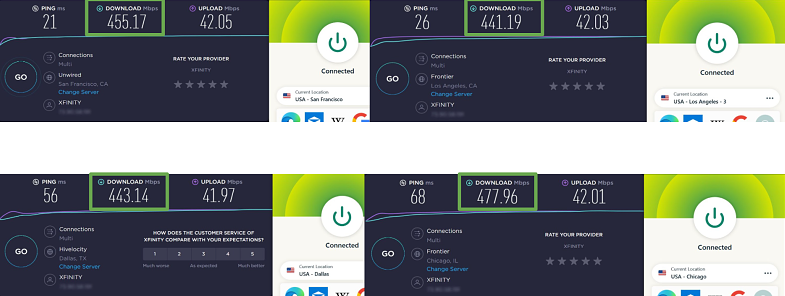
Don’t listen to VPN reviews that tell you a VPN enhances your regular internet speed. Such claims are false because the software has to reduce internet speed to work.
If speed is your priority, your best bet is to use a VPN that only reduces yours by a negligible amount.
After running several speed tests on ExpressVPN, I discovered the following:
- Download: 54mbps – 65mbps
- Upload: 4mbps – 6mbps
- Ping: 7ms – 70ms
I had no problem playing video games and streaming 4k videos through the VPN tunnel, thanks to its high download speed. The ping wasn’t bad either, although there were several fluctuations.
The only real problem I had was with the upload speed. Honestly, it was a struggle streaming with it.
Experts say a 10mbps speed is good enough for live streaming on most platforms, and from my experience, I strongly agree.
Stability
A typical occurrence is for the VPN connection to cut off on occasion, particularly when your internet glitches. Your VPN’s ability to maintain connection in these instances mostly defines its stability.
ExpressVPN was stable for the most part. There were a few instances where the connection dropped, especially when I put my laptop on sleep mode.
Compatibility
ExpressVPN supports all types of mobile devices. I used both Android and iOS, and the service offers VPN apps for them. I also use it for my PC, which runs on the Windows Operating System.
They also have dedicated apps for Linux, macOS, Chromebook, Amazon Fire, and even routers!
Browser extensions can save you a lot of time and storage space. ExpressVPN has extensions for Chrome, Firefox, and Edge – three popular browsers.
Then there’s the MediaStreamer feature. It unlocks any geo-restricted content on popular streaming services.
You don’t even need to connect your streaming devices like smart TVs (e.g., Android TV) and gaming consoles (e.g., PlayStation) directly to the VPN software.
MediaStreamer was fun to use, but I noticed that the gadgets I used it with counted as part of my total connected devices. More on this next.
Connectivity
Most paid VPN providers place a limit on the number of devices you can connect to your account simultaneously. I know, it sucks, but that’s the reality.
ExpressVPN allows a maximum of five simultaneous connections per account.
Data caps
Another unsavory VPN practice is placing data and bandwidth caps on paid customers. Thankfully, this is uncommon.
ExpressVPN has no data caps.
Server Locations

Server distribution is vital when it comes to picking a VPN provider. It affects speed, stability, and usability.
ExpressVPN has over 3000 servers in 94 different countries.
User Interface
A VPN with a good interface does not require you to have advanced technical capabilities. ExpressVPN meets this mark in flying colors as it’s extremely easy to use.
Check out ExpressVPN alternatives here.
CyberGhost

Speed
After running speed tests to determine CyberGhost’s internet connection speeds, I got the following information:
- Download: 16mbps – 30mbps
- Upload: 3mbps – 15mbps
- Ping: 16ms – 153ms
Although not as fast as ExpressVPN’s, the download speed was always enough for me to stream 4k and UHD videos. Netflix says you need at least 15mbps to do this, so I believe you would have a similar experience.
Where CyberGhost truly shines is its upload speed. With a max of 15mbps (I experienced faster speeds when I used WireGuard protocol), I had no trouble live streaming. Although the ping was kind of high, that didn’t bother me too much.
Stability
The VPN software was pretty stable most of the time. There were occasions when the VPN connection dropped, but overall, I had no serious issues.
Compatibility
CyberGhost has mac and iOS apps. There are also apps for Windows, Linux, Amazon Fire, and Android devices. Like ExpressVpN, they have dedicated router apps.
For browser extensions, I only found software for Chrome and Firefox. With the smart DNS feature, I enjoyed VPN benefits on my smart TV and gaming consoles.
Connectivity
Every CyberGhost account is entitled to a maximum of seven simultaneous connections – which is slightly better than what ExpressVPN allows.
Data caps
There are no data restrictions with CyberGhost VPN.
Server Locations
The VPN company has 7800+ servers located in 91 countries.
Apparently, having more servers doesn’t guarantee better performance as there are other factors at play, such as server quality (high-end RAM only servers are best) and maintenance frequency.
User Interface
CyberGhost apps and extensions are easy to use, although the interface is not as simple as ExpressVPN’s.
🏆 Winner is: ExpressVPN
ExpressVPN shows why it’s a top VPN provider in the industry, thanks to its slightly superior speed and ease of use.
Security & Privacy
| ExpressVPN | CyberGhost | |
| Encryption Technology | AES standard – Traffic Mixing VPN Protocols: Lightway, OpenVPN, L2TP/IPsec, and IKEv2 | AES standard VPN Protocols: OpenVPN, WireGuard, and IKEv2 |
| No-Log Policy | Not 100% – logs the following: Personal Data: email address, payment info, and order history Anonymous Data: App versions used, server locations used, connection dates, amount of data used, crash reports, and connection diagnostics | Not 100% – logs the following: Personal Data: email address, name, payment info, country, and order history Anonymous Data: browser version settings & info, connection diagnostics, metadata properties, usage stats, and advertising ID |
| IP Masking | Yes | Yes |
| Kill Switch | System-wide | System-wide |
| Ad-blocker | None | Browsers only |
| Malware Protection | None | Websites only |
What most VPN users seek is more secure and private internet access. Hence, I decided to dedicate an entire category to analyzing the security features of both ExpressVPN and CyberGhost.
ExpressVPN
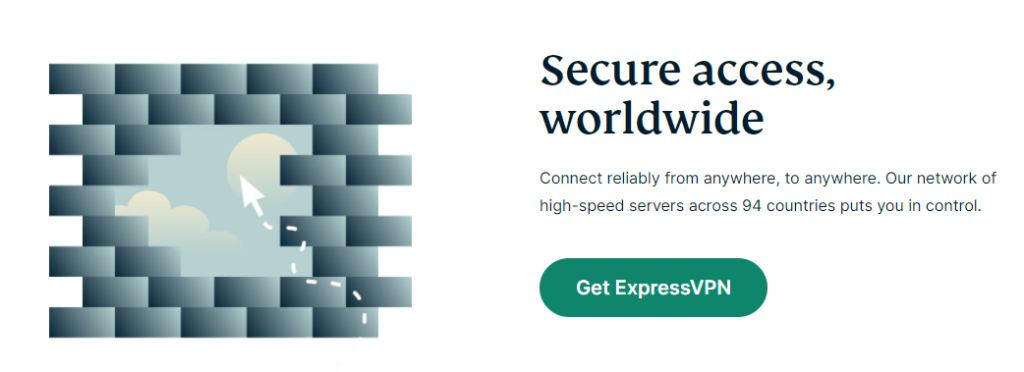
Encryption Technology
Here’s a rundown of how a secure VPN should work:
- The VPN users connect their devices to the software
- It creates an encrypted VPN tunnel
- Users’ entire network traffic passes through the tunnel
- Only VPN servers can interpret the encryption and tunneling protocols from the tunnel – third parties can’t
For optimal data security and online privacy, you should only use a VPN service with AES standard encryption.
ExpressVPN uses AES 256-bit standard encryption. This is military-grade and one of the best you can buy.
The VPN provider also mixes your network traffic with other users’ so not even they can tell your data apart from others.
No-Log Policy
Most VPN services claim to not keep logs of their user’s browsing and software usage. I’ve always been skeptical about such claims because it’s nearly impossible to verify.
Our only chance is for the VPN company to submit to a third-party audit. ExpressVPN says they keep some personal data such as email addresses and order info. The other data they collect are anonymous (see table above).
I’d take their 100% logless claim with a grain of salt if I were you, especially since they are based on British Virgin Island – a place with regular data privacy rules.
Their no-log policy is not 100%, but the info they collect is unlikely to be harmful.
IP Masking
To make it difficult for others to track you or your location, you need to hide your IP address. IP masking is a VPN feature that achieves this by changing your IP address to one that can’t be linked to you.
ExpressVPN offers IP masking.
Kill Switch
Like I said when discussing stability, VPN connections can sometimes drop. When this happens, your online privacy and security become vulnerable.
This is why the kill switch exists. It cuts off internet access, and your entire network traffic is put on hold until a secure connection is restored.
ExpressVPN uses such a system-wide kill switch.
Ad-Blocker
Ads are only helpful when in moderation. Unfortunately, some advertisers don’t see things that way. Certain VPNs have features to help with this, including ad-blockers that protect your browsers, apps, or both.
I was disappointed to find that ExpressVPN offers no ad-blocker in its features.
Malware Protection
Some VPNs also have security features that keep you safe from malware when you browse websites or download files from the net.
I didn’t find any feature for malware protection with ExpressVPN.
CyberGhost
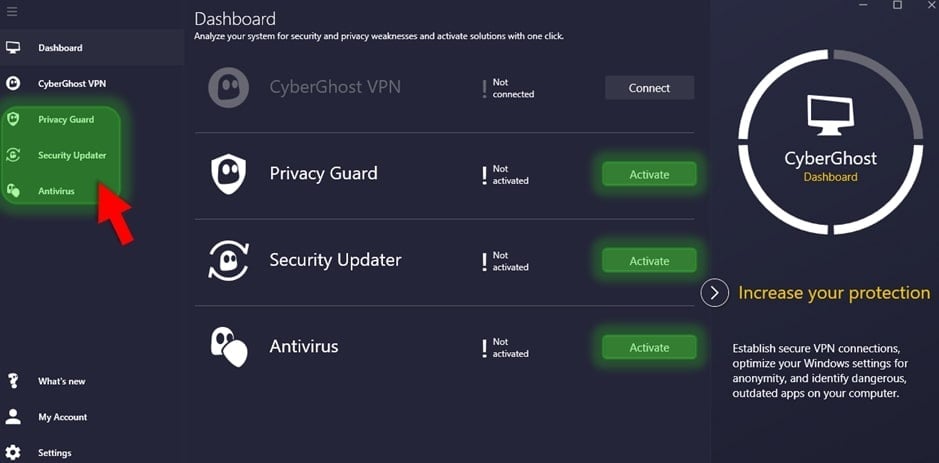
Encryption Technology
CyberGhost VPN tunnels are encrypted according to the AES 256-bit standard. You can rest assured that your data won’t be intercepted.
No-Log Policy
Although CyberGhost claims to have a no-log policy, an in-depth check of their privacy page revealed that they do keep some personal and anonymous data (see table above).
There were some saving graces, though. Firstly, you should know that the company is based in Romania, where data retention laws are relatively relaxed.
Secondly, they publish quarterly transparency reports that highlight their commitment to keeping VPN users’ data away from third parties, including the government.
Very few VPN providers can pull that off. You can download the latest report HERE.
I’ll say they don’t offer a 100% no-log policy.
IP Masking
CyberGhost offers IP masking to all active user profiles.
Kill Switch
They also offer a system-wide network lock kill switch.
Ad-Blocker
I was delighted to discover that, unlike ExpressVPN, CyberGhost has an ad-blocker built into a feature called “Content Blocker.” It protects only your browsers.
Malware Protection
The content blocker feature also helps to keep you out of websites with malware.
🏆 Winner is: CyberGhost
CyberGhost’s ad-blocker, malware protection, and no-log transparency give them the edge they need to win this round.
Pricing & Plans
| ExpressVPN | CyberGhost | |
| Free Plan | None | None |
| Subscription Durations | One Month, Six Months, One Year | One Month, One Year, Two Years, Three Years |
| Cheapest Plan | $8.32/month | $2.29/month |
| Most Expensive Monthly Plan | $12.95/month | $12.99/month |
| Best Deal | $99.84 for ONE year (save 35%) | $89.31 for THREE years (save 82%) |
| Best Discounts | 12-Month Paid Plan + 3 Free Months | 36-Month Paid Plan + 4 Free Months12-Month Paid Plan + 6 Free Months |
| Refund Policy | 30 days | 45 days |
How much did it cost me to use these services? Let’s find out.
ExpressVPN
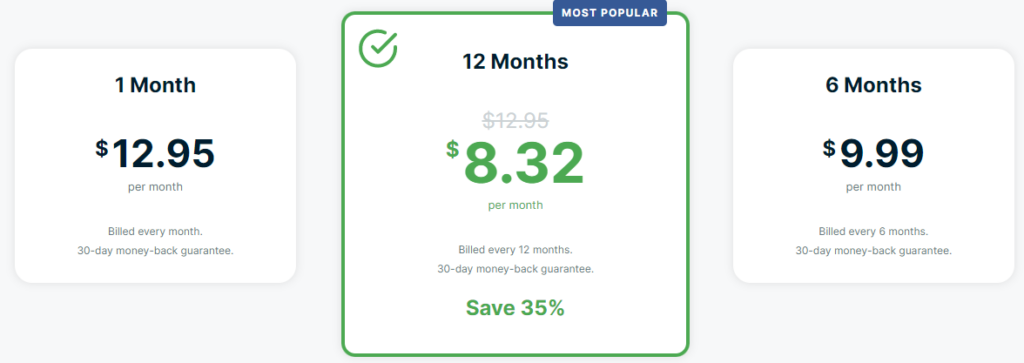
They offer three plans:
- 1 Month at $12.95/month
- 6 Months at $9.99/month
- 12 Months at $8.32/month
I would typically choose the 12-month plan directly from their pricing page to save 35%. But thankfully,
I checked for discounts first…
ExpressVPN offered a coupon that gave me an extra 3 free months when I purchased the 12-month plan. Although this was a limited offer, you can check if it’s still available on the ExpressVPN coupons page.
CyberGhost
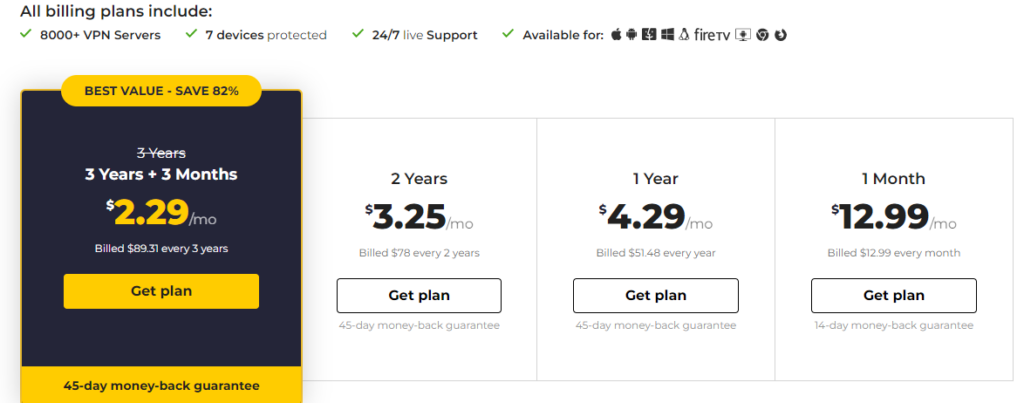
The service offers four plans:
- 1 Month at $12.99/month
- 1 Year at $4.29/month
- 2 Years at $3.25/month
- 3 Years at $2.29/month
Naturally, I would pick the 3-year plan and save 82%. Plus, I wouldn’t have to worry about a VPN subscription for several years.
However, I claimed a 79% discount on the CyberGhost coupons page. It gave me a one-year plan with six free months.
🏆 Winner is: CyberGhost
The Ghost has cheaper plans, more options, better deals, and a longer refund period. Clear winner.
Customer Support
| ExpressVPN | CyberGhost | |
| Live Chat | Available | Available |
| Available | Available | |
| Phone Support | None | None |
| FAQ | Available | Available |
| Tutorials | Available | Available |
| Support Team Quality | Excellent | Average |
Support is vital for all SaaS products. Here, I compare CyberGhost with ExpressVPN in this aspect.
ExpressVPN

The service offers 24/7 live chat and email support. I tried to reach out to their support team twice and got a response within 24 hours both times.
There are also some self-help FAQs and tutorials on the website.
To ensure other users were receiving the same quality treatment, I checked out ExpressVPN’s customer support reviews on Trustpilot.
Of the latest 20, 19 reviews were excellent, and 1 was average. Safe to say, ExpressVPn has excellent customer support.
CyberGhost
This VPN provider also offers 24/7 live chat and email support. But, when I tried to reach their support team, it took longer to get a response from them (over 24 hours).
Thankfully, they have fully-stocked FAQs and tutorials.
Checking Trustpilot, I found 9 excellent, 9 bad, and 2 average reviews. From my experience and those of other users, CyberGhost has average customer support.
🏆 Winner is: ExpressVPN
Between CyberGhost and ExpressVPN, the latter offers better customer support.
Extras
| ExpressVPN | CyberGhost | |
| Split Tunneling | Yes | Yes |
| Connected Devices | Router app and MediaStreamer | Router app |
| Unlockable Streaming Services | 20+ services, including Netflix, Amazon Prime, Disney+, BBC iPlayer, and Hulu | 20+ services, including Netflix, Amazon Prime, Disney+, BBC iPlayer, and Hulu |
| Dedicated IP Address | No | Yes |
What extra features do CyberGhost and ExpressVPN bring to the table?
ExpressVPN
Split tunneling is a fancy VPN feature that allows you to only set which software (e.g., bank apps, work apps, streaming services) will use a VPN connection to access the internet.
ExpressVPN offers split tunneling.
Also, you can connect gaming, IoT, and streaming devices to your VPN through the router app or MediaStreamer.
With ExpressVPN, you’ll get obfuscated servers that can bypass geo-restricted content walls and get you content from 20+ services, including Netflix, Amazon Prime, Disney+, BBC iPlayer, and Hulu.
CyberGhost
CyberGhost also offers split tunneling, and you can connect your devices using the router app. I used it to access all the popular streaming platforms with no issues.
Their most important extra service is the dedicated IP. You don’t have to share an IP with other random VPN users if you purchase this ad-on.
A dedicated IP is perfect for working on company sites that frown upon IP changes. It will also ensure the clean reputation of your IP address.
🏆 Winner is: CyberGhost
Having a dedicated IP address gave CyberGhost the narrow win over ExpressVPN.
Wrap Up
So, for a final verdict. I believe CyberGhost is the better VPN for regular, security-minded VPN users. It offers premium protection at ridiculously affordable rates.
Not to say there are no instances when picking ExpressVPN would be a better choice.
If you prefer to better performance for gaming competitively or to download, you should try the ExpressVPN service.
Otherwise, I would recommend that you try CyberGhost. They both offer refunds, so it’s a no-brainer.
How We Review VPNs: Our Methodology
In our mission to find and recommend the best VPN services, we follow a detailed and rigorous review process. Here’s what we focus on to ensure we provide the most reliable and relevant insights:
- Features and Unique Qualities: We explore each VPN’s features, asking: What does the provider offer? What sets it apart from others, such as proprietary encryption protocols or ad and malware blocking?
- Unblocking and Global Reach: We assess the VPN’s ability to unblock sites and streaming services and explore its global presence by asking: How many countries does the provider operate in? How many servers does it have?
- Platform Support and User Experience: We examine the supported platforms and the ease of the sign-up and setup process. Questions include: What platforms does the VPN support? How straightforward is the user experience from start to finish?
- Performance Metrics: Speed is key for streaming and torrenting. We check the connection, upload, and download speeds and encourage users to verify these on our VPN speed test page.
- Security and Privacy: We delve into the technical security and privacy policy of each VPN. Questions include: What encryption protocols are used, and how secure are they? Can you trust the provider’s privacy policy?
- Customer Support Evaluation: Understanding the quality of customer service is crucial. We ask: How responsive and knowledgeable is the customer support team? Do they genuinely assist, or just push sales?
- Pricing, Trials, and Value for Money: We consider the cost, available payment options, free plans/trials, and money-back guarantees. We ask: Is the VPN worth its price compared to what’s available in the market?
- Additional Considerations: We also look at self-service options for users, such as knowledge bases and setup guides, and the ease of cancellation.
Learn more about our review methodology.
